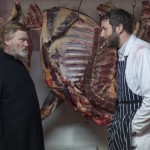David Lose goes on to talk about Jesus’s coming:
Years ago I preached a sermon about the offensive nature of God’s grace, suggesting that we might add four words to the end of our service of baptism, saying, “Child of God, I baptize you in the name of the Father, and of the Son, and of the Holy Spirit…like it or not.” A few weeks later, a friend shared a bedtime encounter he’d had with his then six-year-old son. Upset that his father was putting him to bed earlier than he wanted to go, Benjamin said, “Daddy, I hate you.” Benjamin’s father, exercising the kind of parental wisdom I hope for, replied, “Ben, I’m sorry you feel that way, but I love you.” Benjamin’s response to such gracious words surprised his dad: “Don’t say that!” “I’m sorry Benjamin, but it’s true. I love you.” “Don’t,” his son protested, “Don’t say that again!” At which point Ben’s father, remembering the words of the sermon, said, “Benjamin, I love you…like it or not!”
Why was Benjamin protesting his father’s love? Because he realized he could not control his father’s love and twist it to his advantage. Indeed, in the face of such love there is no bargaining and, ultimately, no control whatsoever.
Having to admit our ontological state of crisis and our need for ontological healing is frightening. Even when the Giver of love and healing is good. We want to pull ourselves up by our bootstraps and declare that we are in fact capable of fixing our broken selves. When we fail, we are devastated. We are stripped bare; our true brokenness is revealed.
But consider God’s position: since we simply are ontologically broken, what ought He do? Ought He restrain His love? Ought He–as a reader of this blog put it–leave us “born sick and commanded to be well”? Or, rather, ought He come to us bringing the gift of ontological healing? If we reject this gift, if we like Naaman are too proud, should we blame God?
John indicts us: we reject God’s light because we love and are comfortable with darkness (vv.19-21). Darkness is comfortable because it demands nothing of us. But then again, it also takes everything from us. It is the ontological brokenness in which we live. We are as comfortable with it as with breathing oxygen. To consider a new way of existence is troubling. We can see in many real life examples how this dynamic plays out. Consider the person who is overweight. They have gotten so used to “eating their feelings” that a new way of freedom feels frightening and threatening. If they exercise, begin to eat fruits and vegetables, and limit their caloric intake, they will come to experience greater well-being and health. They will likely live longer and experience greater emotional health as well. But to cast oneself aside from the control that the unhealthy patterns provide can be terrifying. Intellectually, one knows that the path they are walking is not providing life but rather death. But emotionally, dying to the old and being raised to new life can be terrifying. This new life will be unfamiliar. The old way may mean death, but at least it is a known entity.
Take a more dramatic illustration, this one from television: On a recent episode of House of Cards, a character (Doug Stamper) lives a spare, unattached existence so that he can focus completely on supporting the image of the President. And yet, he struggles with addiction, he lacks any genuine engagement with mutual relationships, he is coldly alone. His brother is his polar opposite–warm, engaged in his family life, refusing to lift work above the importance of family, willing to even lose his job for the sake of family. One day they discuss their different approaches to life. And Doug says that only he is able to be truly free since he is free of attachment and entanglement. But his brother points out that such a manner of existence is not true freedom. Freedom is lived in and through self-giving love. Doug exists in a state of ontological death, a vividly heightened picture of the “perishing” of which John 3 speaks. His brother lives in an ontological state of life, such as the eternal life the passage pictures. For ontological death and life begin now. They are not so oriented toward destinations as they are natural states of being.
I can hear some objections echoing back at me through the computer screen: Look, Rebecca, I’d believe if I could, but I have some real questions that I don’t feel like Christianity is adequately answering. Or: I’d love to believe God is good, but I find myself unconvinced. Or: I don’t want to go do bad things like this passage seems to suggest; I just don’t think Christianity is true. Or: Jesus was great, but His followers (or perhaps other people I trusted) have hurt me badly. Being vulnerable by yielding to faith seems terrifying.
I don’t think this passage is meant to speak to every question or objection that we find ourselves in. What it speaks to is an understanding of the ontological state human beings are and to what God has done to rescue them. I do think God understands that we have genuine questions, genuine wounds, genuine doubts. Even the judgment-heavy book of Jude suggests that people experience doubt for a variety of reasons and that therefore Christians should not have a one-size-fits-all approach to those who doubt (vv.22-23). And Jesus is the One of whom it is said:
“A bruised reed he will not break,
and a smoldering wick he will not snuff out…”–Matthew 12:20
I don’t think every person who finds themselves in a state of doubt about or rejection of Christianity simply wants to go embrace darkness. But I also think it’s worth examining one’s heart and asking oneself if part of our motivation for rejecting faith is that it hurts our pride or that contemplating this new life is just too uncomfortable. Maybe that isn’t our issue, and that’s fine, but sometimes it is.
Wherever we find ourselves, John 3 tells us something powerful. God is not interested in condemning people. What He’s interested in is bringing ontological healing and new life to people who are ontologically broken and living into death. Through Jesus’s presence among us, He brought that new life to you and to me.
What about you? Have you ever noticed things in yourself that suggest more comfort with ontological brokenness than with health (because of familiarity)? Does the idea of trusting God seem scary? Why or why not? Do you think it’s hard or easy to understand what motivates you internally when it comes to belief in God or lack thereof?
——————-
Community discussion guidelines:
Because this is a Christian blog, the things I’m talking about will obviously be topics that people feel strongly about in one direction or another. Please keep in mind that this is a place for substantive, respectful conversation. All perspectives are welcome to discuss here as long as all can treat each other with kindness and respect. Please ignore trolls, refuse to engage in personal attacks, and observe the comment policy listed on the right side of the page. Comments that violate these guidelines may be deleted. For those who clearly violate these policies repeatedly, my policy is to issue a warning which, if not regarded, may lead to blacklisting. This is not about censorship, but about creating a healthy, respectful environment for discussion.
P.S. Please also note that I am not a scientist, but a person with expertise in theology and the arts. While I am very interested in the relationship between science and faith, I do not believe I personally will be able to adequately address the many questions that inevitably come up related to science and religion. I encourage you to seek out the writings of theistic or Christian scientists to help with those discussions.
———————-












